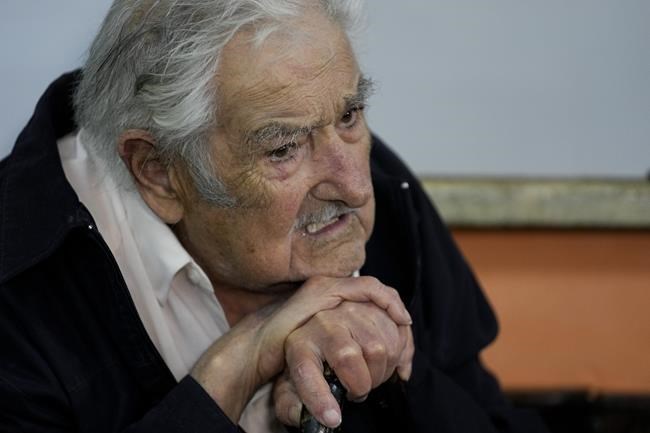
FILE - Uruguay's former President Jose "Pepe" Mujica sits inside a polling station while waiting to vote in the presidential run-off election in Montevideo, Uruguay, Nov. 24, 2024. (AP Photo/Natacha Pisarenko, File)
January 09, 2025 - 10:15 AM
SANTIAGO, Chile (AP) — Uruguay’s former guerilla-turned-president, José Mujica, announced on Thursday that the cancer in his esophagus had spread to his liver, and that he had chosen to forgo further treatment.
In what Mujica said would be his last interview, he told Busqueda, a weekly news magazine in Uruguay, that he was “doomed.”
“Honestly, I am dying,” said the former leader, who governed the small South American nation of Uruguay from 2010 to 2015. The article noted that he had tears in his eyes.
“What I ask is that they leave me alone. Don’t ask me for more interviews or anything else," he said. “My cycle is over.”
Known among both fans and detractors as “Pepe” Mujica, the folksy ex-president of Uruguay first burst into politics as a leader of the Tupamaros, the Marxist militant group that drew inspiration from the Cuban revolution.
Later, as Uruguay's 40th president, he transformed his nation into one of the healthiest and most socially liberal democracies in Latin America, legalizing abortion, same-sex marriage and recreational marijuana. As a leftist icon, he sparked global fascination by shunning the presidential palace to live in a tiny farmhouse and donating most of his salary to charity.
The 89-year-old first revealed last April that doctors had found a cancerous tumor in his esophagus. He underwent radiotherapy, and, last September, Mujica’s doctors said the esophageal cancer appeared to have gone into remission.
Although the radiation left him weak and almost unable to eat, Mujica reappeared on the political stage last fall, campaigning for his left-wing coalition, the Broad Front, in drama-free national elections that affirmed Uruguay as one of the region's strongest democracies.
Mujica's preferred candidate and protégé, Yamandú Orsi, won the presidential vote last November and is set to take office March 1.
In the interview with Busqueda, Mujica said his autoimmune disease, severe kidney disease and other underlying medical problems led to his decision not to pursue treatment after medical tests showed his cancer had returned and metastasized.
“I’m an old man, and because I have two chronic illnesses my body cannot handle it," he said.
Mujica's personal doctor, Raquel Pannone, held a news conference Thursday to elaborate on the ex-president's medical condition. She said treatment options for the cancer were limited from the start, given Mujica's various illnesses.
“He should continue like this and be as calm as possible,” Pannone said, declining to provide further details about Mujica’s prognosis. She said the leftist leader had not experienced changes to his daily life or pain levels.
Although Mujica ostensibly retired from politics when he left the Senate in 2020, he remained a powerful force in the Broad Front. He is considered among the most popular politicians in the country.
Mujica told Busqueda that he would devote his “final stage” of life to his farm on the outskirts of Montevideo, the capital, where he has grown chrysanthemums with his wife for decades.
“What I want is to say goodbye to my fellow countrymen,” he said in the interview.
His supporters, including leftist readers from across Latin America, shared messages of encouragement on social media.
Seemingly unable to help himself from dispensing the plain-spoken wisdom for which he is admired, Mujica repeatedly answered interview questions with philosophical aphorisms.
"Life is a beautiful adventure and a miracle," he said. “We are too focused on wealth and not on happiness. We are focused only on doing things and, before you know it, life has passed you by.”
News from © The Associated Press, 2025